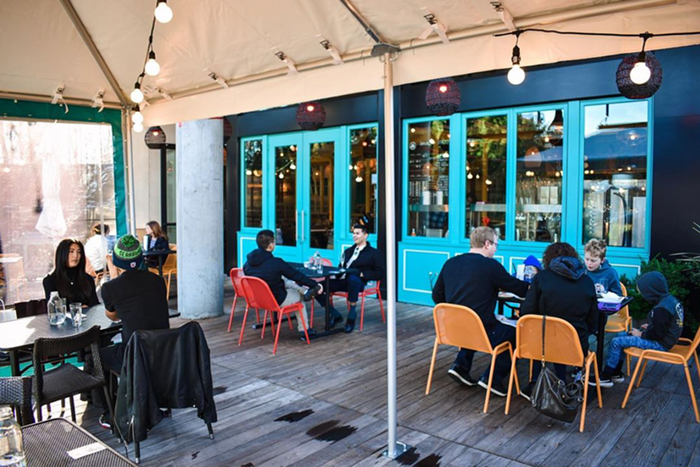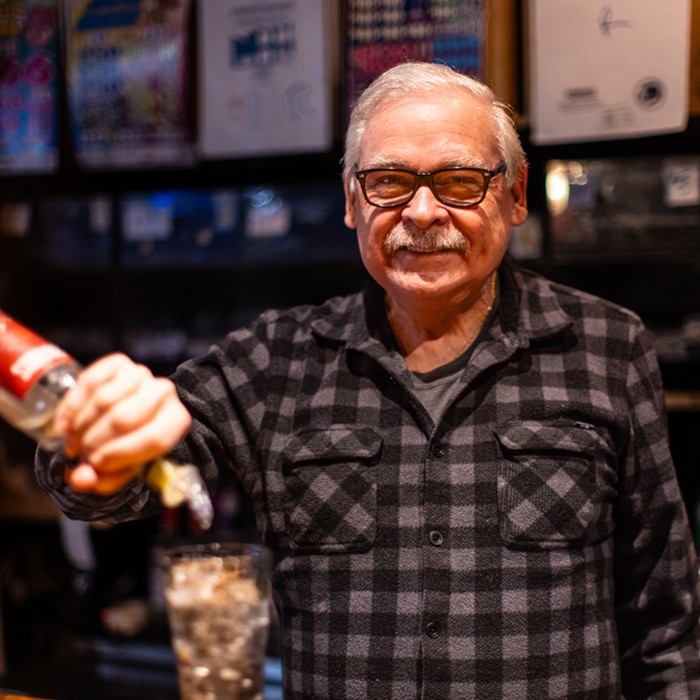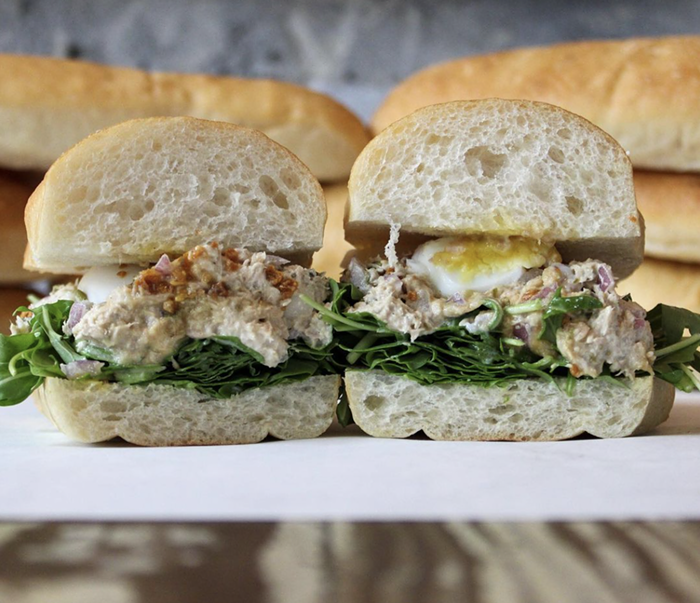A few years ago, I spent two memorable weeks in Salvador, Brazil, a city that was a major port during the Atlantic slave trade and whose culture still retains a strong African influence. Unsurprisingly, my favorite memories are of food, specifically the inordinate amount of time I spent stalking and trying dozens of versions of a dish called acarajé: small cakes of mashed black-eyed peas that are deep-fried in dendê—dark-red palm oil—then split in half and stuffed with a thick paste made from shrimp and cashews.
Acarajé, whose roots lie in West Africa, is sold throughout the streets of Salvador by women called baianas, who are easily recognizable by their distinct round skirts, white blouses, and brightly colored turbans. Within a few days, I found my favorite baiana; she added small, shell-on, boiled prawns, as well as a heaping spoonful of gooey, spicy stewed okra, to her dish. I spent nearly every day I was there scheming to get back across town to eat her acarajé.
Street-food vendors around the world aren't just cooks, they're specialists. Their success relies on perfecting a dish. If what they're offering isn't top-notch, there are dozens of other vendors waiting to take their business. It's why on any given street in Hanoi, La Paz, or Cairo, you'll see one stand with a long line, while others selling the exact same thing languish with barely any customers.
Given that, the concept of Capitol Hill's Nue, which opened in January, strikes me as especially daunting. Inspired by the many remarkable meals he had over two decades of travel, first-time restaurateur Chris Cvetkovich envisioned a menu of street food from around the world—a sort of global greatest-hits list in which dishes from Korea, Vietnam, Jamaica, Latvia, and Syria exist side by side.
At my first meal at Nue, I started with balut ($7), a boiled egg containing a mostly developed duck embryo that's a popular drinking snack in the Philippines. Thanks to douchey shows like Fear Factor and Bizarre Foods, balut has gotten a reputation as a gross-out food, but as someone who grew up eating and loving it, I appreciated Nue's respectful and straightforward presentation.
Nue's version is good—the egg is served, still warm, in a bowl with a dish of salt and pepper, as well as a wedge of lime and, per the Vietnamese preparation of the dish (which is called hot vit lon), fresh leaves of the cilantro-esque herb rau ram. Cracking into the shell, I sucked out the salty, deeply flavorful broth—imagine the taste of a long-simmered chicken stock, multiplied by 100—then opened it up and happily worked my way through its soft, gelatinous bits of duck. I was sitting in the heart of Capitol Hill, but for a brief moment I was standing on the street in Manila, feeling as giddy as I would after a few too many San Miguel beers.
Other dishes at Nue are equally transportive, like grilled Barbados pig tails ($12)—a stack of six squat appendages drizzled with a jerk glaze that's slightly too sweet. Long before they hit the grill, the tails are boiled to help break down their cartilage. It's worth every moment of that time, as they hold a delectable, almost equal ratio of tender meat to unctuous fat, both of which are wrapped tightly around small, slippery bones underneath crispy, smoky skin. The dish is pure lip-smacking pleasure.
Another unnecessarily sweet glaze (this one made with fish sauce) interfered with—but thankfully didn't ruin—Chengdu jumbo chicken wings ($14), which are skewered to form a delightful tower o' chicken. The crispy, deep-fried, and remarkably juicy wings are dusted with floral, lip-numbing green Szechuan peppercorns and slices of fiery red Thai bird chilies. Ribbons of mint scattered on top help cool down the tongue.
On the lighter side, there's the Syrian kale and carrot salad ($8): dark greens tossed in a dressing of tart lime juice, pomegranate molasses, and plenty of earthy cumin, balanced by sweet carrots and dates. Feta cheese and sliced almonds add just the right amount of saltiness and crunch.
Not everything at Nue is a success, however. Trinidad goat curry ($17)—a stew seasoned with warming spices such as ginger and turmeric—also suffered from an excess of sugar, and the meat was tragically dry and stringy. Korean bibim naengmyeon ($13)—chilled sweet-potato noodles with vegetables, hard-boiled egg, and a pineapple-gochujang sauce—was just plain bad. The shiitake mushrooms had been soaked in a soy-sauce mixture that rendered them so salty as to be inedible, and the dish's many elements didn't cohere, resulting in something that was more akin to a muddled pile of stuff heaped upon cold, bland noodles.
I was curious how Cvetkovich and executive chef Joe Swain source their many far-flung ingredients. I caught up with Cvetkovich by phone last week; he was at the airport, about to board a plane for a 10-day trip to Korea and Vietnam to pick up silverware for the restaurant.
"Because we're a small restaurant, we can't order in bulk," said Cvetkovich, who spends much of his time procuring ingredients. "And we can't go through [food distributors] Charlie's or Merlino for betel leaves or rau ram, so I'm doing runs to Mexican and Asian markets pretty much every day, as well as ordering things online. But even in the age of the internet, there are still things you can't find."
Cvetkovich told me about how it took him years to find a source for the Thai water beetles Nue offered earlier this year, and how he's determined to track down some "giant barnacles" he ate in Chile many years ago. "I've been thinking about them ever since," he says, wistfully. "I'm still convinced I can find them."
Beetles, barnacles, duck embryos—these are humble street-food staples around the world that may find a wider audience through Nue. But Cvetkovich and Swain still need to perfect their dishes if they're to truly emulate the best street-food cooks around the world and be the kind of restaurant that people will stalk from across town. ![]()



















